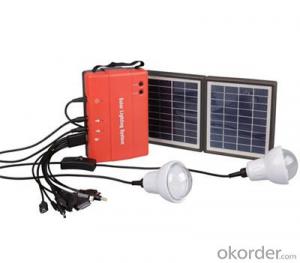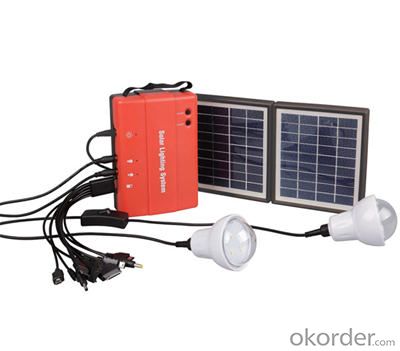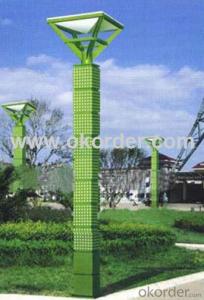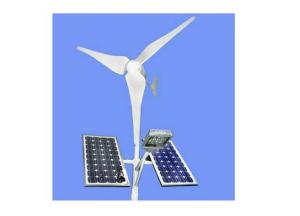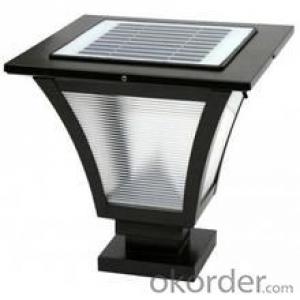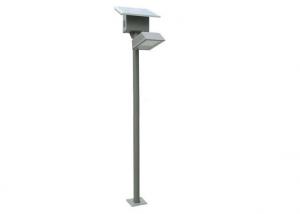MINI SOLAR LIGHTING SYSTEM
- Loading Port:
- Guangzhou
- Payment Terms:
- TT OR LC
- Min Order Qty:
- -
- Supply Capability:
- 10000 unit/month
OKorder Service Pledge
Quality Product, Order Online Tracking, Timely Delivery
OKorder Financial Service
Credit Rating, Credit Services, Credit Purchasing
You Might Also Like
Description:
Portable Solar Lighting System With 2 Lights
1, Foldable solar panels
3, USB mobile charging
Rechargeable by 3.4W solar panel
Body Material: ABS+PC
Battery: 4.5AH/6V Lead acid
Lighting time: 15 hours working after fully charged for 2 bulbs
Overcharge, over dischargeprotection controller
Accessory: 2 pcs of 0.9W LED bulbs with 5M long line cord each
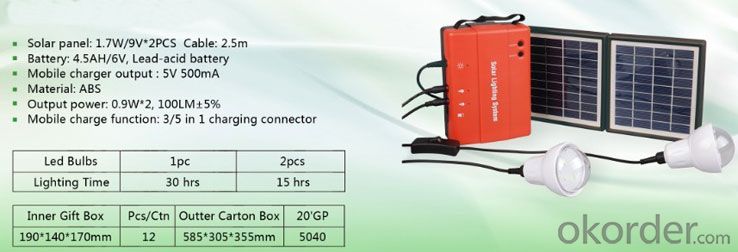
- Q: Can solar energy systems be used in areas with limited access to solar energy consultants?
- Yes, solar energy systems can still be used in areas with limited access to solar energy consultants. While it may be more challenging to design and install the system without professional guidance, there are resources available online, such as DIY guides and tutorials, that can help individuals or communities in such areas to set up solar energy systems. Additionally, remote consultation services and online forums can provide guidance and support in navigating the installation process.
- Q: What is the impact of dust and dirt on the performance of solar panels?
- The performance of solar panels is significantly affected by dust and dirt. When dust settles on the panel surface, it forms a layer that blocks sunlight from reaching the photovoltaic cells. This causes a decrease in light absorption and overall energy output. Over time, the accumulation of dust can greatly reduce efficiency and impact the system's performance. Additionally, dirt and dust can create shading on the panels, resulting in hotspots. These hotspots can cause localized heating, potentially damaging the panel's electronics and reducing their lifespan. The increased temperatures also lead to decreased efficiency and further decrease energy production. To mitigate the impact of dust and dirt, regular cleaning and maintenance of solar panels are crucial. This can be done manually through periodic washing or by installing automated cleaning systems to keep the panels free from debris. By ensuring clean panels, the amount of sunlight reaching the photovoltaic cells is maximized, optimizing energy production and promoting the longevity of the solar panel system.
- Q: Can solar energy systems be used in powering hospitals or healthcare facilities?
- Certainly, solar energy systems can be utilized to power hospitals and healthcare facilities. Actually, numerous healthcare institutions worldwide are already employing solar power as a dependable and sustainable source of electricity. Solar energy systems consist of photovoltaic (PV) panels that convert sunlight into electricity, which can then be used to operate various equipment and appliances within the facility. There are several advantages associated with using solar energy in healthcare facilities. Firstly, it aids in reducing operational costs by providing a long-term and sustainable electricity source. Hospitals and healthcare facilities require a substantial amount of energy to run medical equipment, lighting, heating, cooling, and other vital systems. By installing solar panels, these institutions can significantly decrease their electricity expenses and allocate their resources towards patient care. Secondly, solar energy systems contribute to environmental sustainability. Hospitals are renowned for their high energy consumption, and traditional energy sources often result in increased carbon emissions and pollution. By transitioning to solar power, healthcare facilities can diminish their carbon footprint and promote a greener and healthier environment. This aligns with the healthcare industry's dedication to advancing public health and well-being. Furthermore, solar energy systems can provide a dependable electricity source, even during power outages or emergencies. Hospitals and healthcare facilities necessitate an uninterrupted power supply to ensure patient safety and well-being. Solar energy systems can be integrated with battery storage solutions, enabling the storage of excess electricity generated during the day for use at night or when there is no sunlight. This ensures a continuous power supply, even during grid outages or natural disasters. It is important to note that the installation of solar energy systems requires careful planning and design to cater to the specific energy needs of hospitals and healthcare facilities. A comprehensive assessment of energy requirements, available space, and system capacity is indispensable to ensure optimal performance and efficiency. Additionally, regular maintenance and monitoring are crucial to ensure the seamless operation of the solar energy system. Overall, solar energy systems offer numerous benefits for hospitals and healthcare facilities. They provide a cost-effective, sustainable, and reliable electricity source, reduce carbon emissions, and contribute to the overall well-being of patients and the environment. As the healthcare industry continues to prioritize sustainability and environmental stewardship, the adoption of solar energy systems in powering hospitals is expected to rise.
- Q: Can solar energy systems be used for water desalination?
- Yes, solar energy systems can be used for water desalination. Solar-powered desalination systems use the energy from the sun to power the process of removing salts and impurities from seawater or brackish water, making it suitable for drinking or irrigation purposes. This sustainable and renewable energy source offers a viable solution to address water scarcity issues in regions with abundant sunlight.
- Q: How does the installation of solar panels affect the building's aesthetics?
- The aesthetics of a building can be significantly affected by the installation of solar panels. At first, the traditional appearance of a structure may be altered by the presence of solar panels on the rooftop or facade, which could be a concern for those who prioritize preserving the original design of the building. However, advancements in solar panel technology have resulted in more visually pleasing options that seamlessly blend with the building's architecture. Architects and designers are now working towards integrating solar panels into the overall design of the building, making them less obtrusive. For example, solar panels can be incorporated into the roof design, creating a sleek and cohesive look. In some instances, solar panels can even enhance the visual appeal of a building, adding a contemporary and eco-friendly element to its appearance. Furthermore, the color and material options for solar panels have evolved, providing a wider range of choices to match the style of the building. Nowadays, solar panels are available in various colors such as black, blue, or even transparent, allowing them to blend in with their surroundings or become an elegant focal point. It is important to note that the aesthetics of solar panel installations are subjective, and opinions may differ. Some individuals may embrace the modern and sustainable look that solar panels bring, while others may find them less attractive. Ultimately, the impact of solar panels on a building's aesthetics depends on the specific design, the preferences of the building owner, and the local regulations governing solar panel installations.
- Q: Can solar energy systems be used in areas with frequent lightning strikes?
- Solar energy systems can indeed be utilized in areas prone to frequent lightning strikes. Despite the potential risks posed to any electrical system, including solar panels, there are established measures in place to mitigate these dangers. Solar panels are specifically designed to endure various weather conditions, including lightning strikes. They possess a sturdy construction and are equipped to handle external stressors such as electrical surges resulting from lightning strikes. Moreover, solar panels are grounded using lightning protection systems, which effectively divert the electrical charge into the ground, thereby minimizing the risk of system damage. In addition to these precautions, solar energy systems generally incorporate surge protection devices and lightning arresters that aid in dissipating and redirecting electrical surges caused by lightning strikes. These protective measures work in unison to safeguard the system and avert any potential harm. It is important to acknowledge that while solar energy systems typically withstand lightning strikes, it is still advisable to consult a professional installer and adhere to local electrical codes and regulations to ensure the correct installation and protection against lightning strikes.
- Q: Can solar energy systems be used in powering wineries or breweries?
- Certainly, wineries and breweries can utilize solar energy systems to effectively power their operations. Indeed, solar power has been widely embraced by many wineries and breweries worldwide as a sustainable and cost-efficient energy solution. These facilities can install solar energy systems on their rooftops or surrounding areas to capture sunlight and convert it into usable electricity. The electricity generated from solar panels can be employed to power various aspects of winemaking or brewing, including lighting, heating, cooling, and machinery. It can also be used for irrigation pumps and ventilation systems, which are critical for maintaining optimal fermentation conditions. By employing solar power, wineries and breweries not only reduce their carbon footprint and dependence on fossil fuels, but also enjoy several financial advantages. Solar energy systems can significantly decrease utility bills, as these establishments typically require a substantial amount of electricity for their operations. Furthermore, certain regions offer incentives and tax credits to businesses that adopt renewable energy sources like solar power. In addition, solar energy systems provide wineries and breweries with energy independence and reliability. These systems can generate electricity even during power outages or peak demand periods when electricity prices are higher. This ensures uninterrupted production and reduces the vulnerability of these facilities to energy shortages or price fluctuations. Overall, the effectiveness of solar energy systems in powering wineries and breweries has been well-documented, offering environmental, financial, and operational benefits. By harnessing the abundant power of the sun, these industries can contribute to a more sustainable future while enjoying the numerous advantages of solar energy.
- Q: Can solar energy systems be used in powering research farms or agricultural laboratories?
- Yes, solar energy systems can certainly be used to power research farms or agricultural laboratories. Solar panels can generate electricity which can be used to power various equipment and machinery used in these facilities, such as irrigation systems, lighting, climate control systems, and other electrical devices. By utilizing solar energy, these agricultural facilities can reduce their reliance on fossil fuels and significantly lower their operational costs while also contributing to a more sustainable and environmentally friendly approach to farming and research.
- Q: What is net metering and how does it work?
- Net metering is a billing arrangement that allows individuals or businesses with solar panels or other renewable energy systems to receive credit for any excess electricity they generate and feed back into the grid. The process of net metering works by installing a bi-directional meter that can measure both the electricity consumed from the grid and the excess electricity generated by the renewable energy system. When the renewable energy system produces more electricity than is being used, the excess is sent back to the grid, and the meter runs in reverse, effectively crediting the system owner for the surplus energy. This credit can then be used to offset the electricity consumed from the grid during times when the renewable energy system is not generating enough power, such as at night or during cloudy days. The system owner only pays for the net amount of electricity used from the grid, which is the difference between the electricity consumed and the electricity generated. Net metering provides several benefits. First, it allows individuals and businesses to reduce their electricity bills by offsetting their consumption with the excess energy they generate. Second, it promotes the use of renewable energy sources, as it provides a financial incentive for individuals to invest in solar panels or other renewable energy systems. Moreover, net metering helps to reduce the strain on the electrical grid by distributing the generation of electricity across multiple sources. Net metering policies and regulations vary by country and state, so it is important for individuals and businesses to familiarize themselves with the specific rules and guidelines in their area. Overall, net metering is a win-win solution that benefits both renewable energy system owners and the environment.
- Q: Can a solar energy system be installed in areas with frequent lightning strikes?
- It is indeed possible to install a solar energy system in areas prone to frequent lightning strikes, but certain precautions must be taken to ensure its safety. Failure to do so could result in potential damage to solar panels, inverters, and other system components. To reduce the risk, several strategies can be implemented. The installation of a lightning protection system (LPS), which incorporates lightning rods, grounding systems, and surge protection devices, is highly recommended. These systems are designed to divert lightning strikes away from the solar panels and safely dissipate the electrical energy into the ground. Additionally, the use of high-quality surge protectors and lightning arrestors in electrical and communication lines can protect the system from power surges caused by lightning strikes. Furthermore, it is crucial to select durable and robust solar panels and inverters that meet industry standards for lightning protection. Some manufacturers offer products specifically designed to withstand severe weather conditions, including lightning strikes. Regular maintenance and inspections are also essential to ensure the continued safety and functionality of the system. This includes checking the integrity of the lightning protection system and inspecting the solar panels and other components for signs of damage or wear. In conclusion, while it is feasible to install a solar energy system in areas with frequent lightning strikes, it is essential to implement proper precautions and protective measures. Collaborating with experienced solar installers who possess knowledge about lightning protection systems can guarantee the secure and efficient operation of the solar energy system, even in high-risk areas.
Send your message to us
MINI SOLAR LIGHTING SYSTEM
- Loading Port:
- Guangzhou
- Payment Terms:
- TT OR LC
- Min Order Qty:
- -
- Supply Capability:
- 10000 unit/month
OKorder Service Pledge
Quality Product, Order Online Tracking, Timely Delivery
OKorder Financial Service
Credit Rating, Credit Services, Credit Purchasing
Similar products
Hot products
Hot Searches
Related keywords
